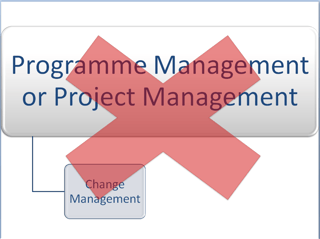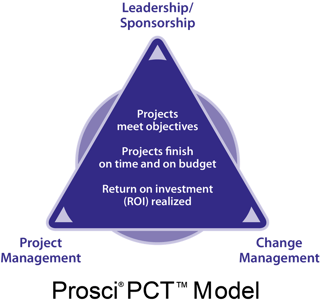Across academic and non-academic research studies, literature¹ has consistently exemplified that effective change management and leadership significantly improves the successful implementation of
Table 1: Success Factors of Change
| McKinsey | Prosci |
|
|

Apart from some differences in semantics, it's intriguing to see how similar they are. These overlaps highlight how success does not typically happen by chance, but rather, by clever planning and ruthless execution within the
However, according to the literature², the problem is that the distinction between changes, projects,
This perspective is dangerously flawed and may lead to overestimates of the capabilities that programme and project management are able to effectively deliver. Moreover, there is also a tendency to elevate programme and project management in status as if they are of higher importance than change management.
These misconceptions significantly reduce the return of investment and business outcomes that organisations aim to achieve. Project management should be understood as an approach that handles the technical changes within an organisation while change management deals with the people side of change. According to the Prosci® PCT triangle, the overall projects' outcomes and return on investment (ROI) depends equally on leadership/sponsorship, change management and project management.


To reiterate, organisations are about achieving business outcomes and return on investment. Prosci’s research has shown that projects with excellent change management are:
- 96% more likely to meet or exceed their objectives
- 72% more likely to be on schedule
- 81% more likely to be on or under budget
CMC Partnership provides Prosci® Delivering Project Results - a one-day, engaging and results-orientated workshop which is designed to bring the two disciplines together. Participants will gain awareness of how change management can help them meet a Project’s intended outcomes.
Interested in finding out more? Access our brochure to learn more about the Prosci® Delivering Project Results workshop.
 Keen to sign up?
Keen to sign up?
The upcoming Prosci® Delivering Project Results workshops are to be held in London on 6th June or in Singapore on 3rd July. If you're interested in managing transofrmational change within your organisation, register below.
References:
¹Gilley, A., Dixon, P., Gilley, J.W., 2008. Characteristics of leadership effectiveness: implementing change and driving innovation in
¹McKinsey & Company, 2010. Retrieved from http://www.mckinsey.com/business-functions/organization/our-insights/what-successful-transformations-share-mckinsey-global-survey-results
¹Prosci 2016. Best Practices in Change Management - 2016 Edition
¹Standish Group, 2013. Chaos report 2013. Retrieved from http://versionone.com/assets/img/files/ChaosManifesto2013.pdf.
¹Turner, J.R., Müller, R., 2005. The project manager's leadership style as a success factor on projects: a literature review. Proj. Manag. J. 36 (2), 49–61.
²Gareis, R. 2010. Changes of




